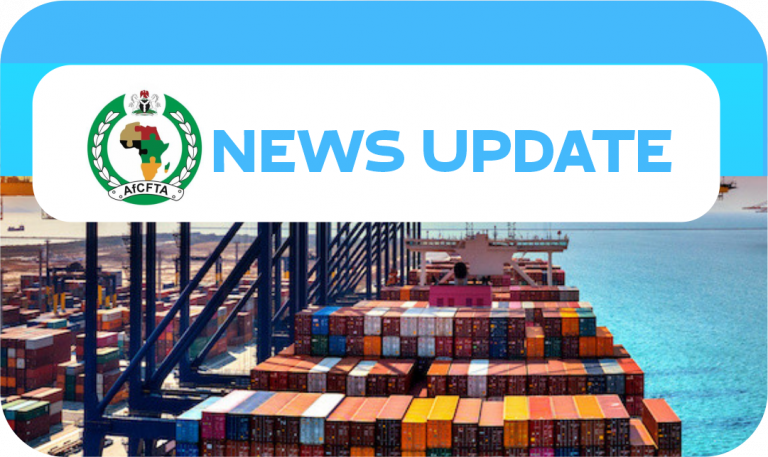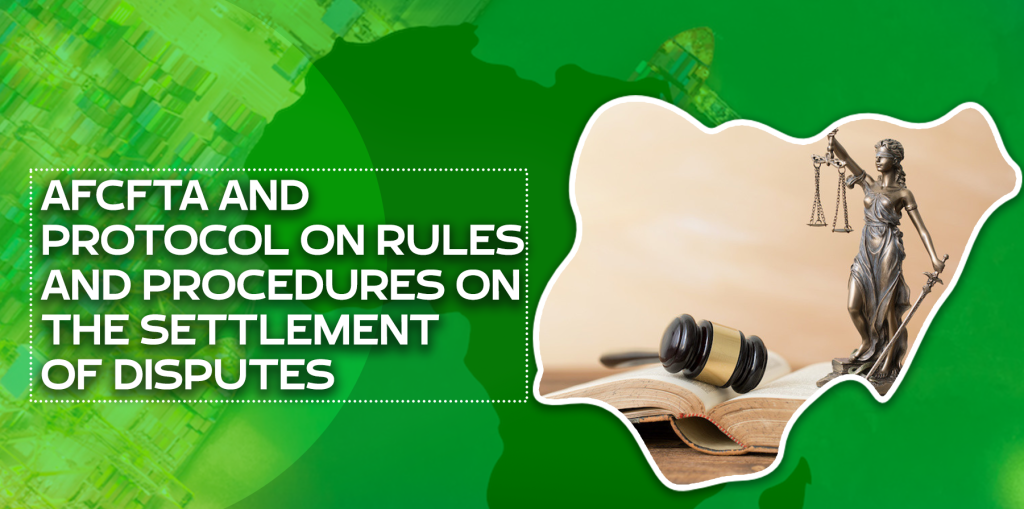AfCFTA and Protocol on Rules and Procedures on the Settlement of Disputes
In the previous article, we examined AfCFTA and Investment Protocols. In case you missed that, you can click here to catch up.
Today’s article focuses on AfCFTA and Protocol on Rules and Procedures on the Settlement of Disputes.
Regional trade agreements play an important role in promoting economic growth and stability in an era of increasing globalization and interconnectedness. The African Continental Free Trade Area (AfCFTA) is a ground-breaking initiative aimed at improving intra-African trade and fostering economic integration across the continent. The Protocol on Rules and Procedures for Dispute Settlement, which serves as a framework for resolving trade-related conflicts, is critical to the success of this agreement. This article examines the significance of AfCFTA and delves into the details of the Protocol, emphasizing its role in ensuring fairness, transparency, and stability in implementation of the agreement.
The AfCFTA, launched in January 2021, is the largest free trade area in terms of participating countries since the formation of the World Trade Organization. It includes 55 African Union member countries, resulting in a unified market of over 1.2 billion people and a combined GDP of more than $3.4 trillion. The Agreement aims to remove trade barriers and increase intra-Africa trade. Its primary goal being the promotion of -trade in value-added production across the African economy’s entire service sector. The AfCFTA will help Africa establish regional value chains, allowing for investment and job creation. The practical implementation of the AfCFTA has the potential to promote industrialization, job creation, and investment, thereby improving Africa’s long-term competitiveness.
Dispute resolution systems are critical to international economic integration. An active, independent, efficient, and dependable Dispute Settlement Mechanism (DSM) is critical not only to resolve disputes between state parties in upholding a rules-based regime but also to develop relevant jurisprudence that will guide the single market economy objective. The DSM will also be important in the AfCFTA context for interpreting areas of overlap or conflict with other former judicial orders in Africa.
The Protocol on Rules and Procedures for Dispute Settlement was adopted to ensure the effective implementation and enforcement of the AfCFTA. This protocol establishes a comprehensive dispute resolution mechanism, providing a clear framework for resolving trade-related conflicts among participating countries. It takes cues from similar mechanisms found in other regional trade treaties, such as the World Trade Organization’s Dispute Settlement Understanding (DSU), while incorporating elements tailored to the African context.
The Disputes Protocol broadly provides for four (4) methods of dispute resolution:
1. Dispute Settlement Body (DSB): The Protocol creates a Dispute Settlement Body to oversee the resolution process. The DSB is composed of representatives from each member country and operates on consensus. It is critical to the impartiality, fairness, and transparency of the dispute resolution process. These processes, however, can only be used if the parties have failed to resolve their dispute during consultations.
2. Consultations and Mediation: The Protocol emphasizes the value of consultations and mediation in resolving disputes amicably. Parties involved in a dispute are encouraged to consult with one another and, if necessary, use the services of mediators to reach mutually acceptable solutions. This approach promotes dialogue and a cooperative environment for conflict resolution.
It is important to note that the Protocols allow sufficiently interested Third-Party States to participate in the consultations and shortens the timelines when the parties’ dispute involves perishable goods.
3. Panels and Appellate Body: If a dispute cannot be resolved by consultations and mediation, the Protocol establishes panels of independent experts. These panels, which are similar to tribunals, investigate the merits of a dispute and render impartial decisions. The Protocol also includes provisions for an Appellate Body (“AB”), which serves as an appellate review mechanism for panel reports, ensuring legal consistency and correctness.
Decisions made by the Appellate Body are final and will be adopted by the DSB, after which they can be enforced in accordance with the Protocol. Appeals to the AB are restricted to legal issues and legal interpretations covered by the Panel Report.
4. Implementation and Compliance: The Protocol emphasizes the importance of timely implementation of dispute settlement rulings by the parties. It encourages the implementation of rulings in good faith and the avoidance of retaliatory measures that may jeopardize the principles and objectives of AfCFTA. Compliance with dispute resolution rulings helps maintain the integrity of the agreement and ensures a level playing field for all participants.
In conclusion, The Protocol on Rules and Procedures for Dispute Settlement is a cornerstone of the AfCFTA, providing member countries with a dependable mechanism for resolving trade-related disputes. By establishing clear procedures, promoting transparency, and ensuring impartiality in decision-making, this protocol contributes to the creation of a fair and predictable trading environment. The AfCFTA, with its ambitious goal of removing trade barriers and increasing intra-Africa trade, has the potential to drive industrialization, job creation, and investment across the continent. As member countries navigate the complexities of regional integration, the dispute settlement protocol acts as a crucial safeguard, boosting trader confidence, facilitating investment, and stimulating economic growth and development throughout Africa.
Reference(s)
- “About The AfCFTA”. AfCFTA, accessed 3rd June 2023.
- “Agreement Establishing The African Continental Free Trade Area”. African Union, accessed 3rd June 2023.
- “Dispute Settlement Mechanism”. AfCFTA, accessed 4th June 2023.
- “Mechanisms For Settlement of Disputes Under the African Continental Free Trade Agreement”. Strachan Partners, accessed 4th June 2023.
- “Nigeria: Dispute Resolution Protocols In African Continental Free Trade Area: Reviewing Existing Protocols And Rules”. Mondaq, accessed 5th June 2023.

AfCFTA: Forge ties to diversify energy mix, NNPC tells African countries
To ensure sustainability of the energy sector on the continent, African countries must take advantage of the implementation of the African Continental Free Trade Agreement (AfCFTA) to diversify their energy sources into a sustainable, low-carbon energy mix, the Group Chief Executive Officer (GCEO) of the Nigerian National Petroleum Company Limited, Mallam Mele Kyari, has said.
READ MORE
Nigerian firm ranked 18th fastest-growing African business
The Financial Times has ranked a Nigerian-owned commodities export and trading company, Neveah Limited, as the 18th fastest-growing company in Africa, in its FT/Statista 2023 Africa’s Fastest-growing companies’ list.
READ MORE
Digital technologies key to inclusive growth in Africa – African Union Commissioner
Digital technologies could offer Africa a great chance to unlock new pathways for rapid, inclusive economic growth and job creation, according to Ambassador Albert Muchanga, the African Union’s Commissioner for Economic Development, Trade, Tourism, Industry and Minerals.
READ MORE
China-US tensions: What will this cost Africa?
The war in Ukraine and the rise in tension between Washington and Beijing have raised fears of another Cold War, marked by the division of the world into two blocs. A perilous configuration for the continent caught in the middle.
READ MORE
